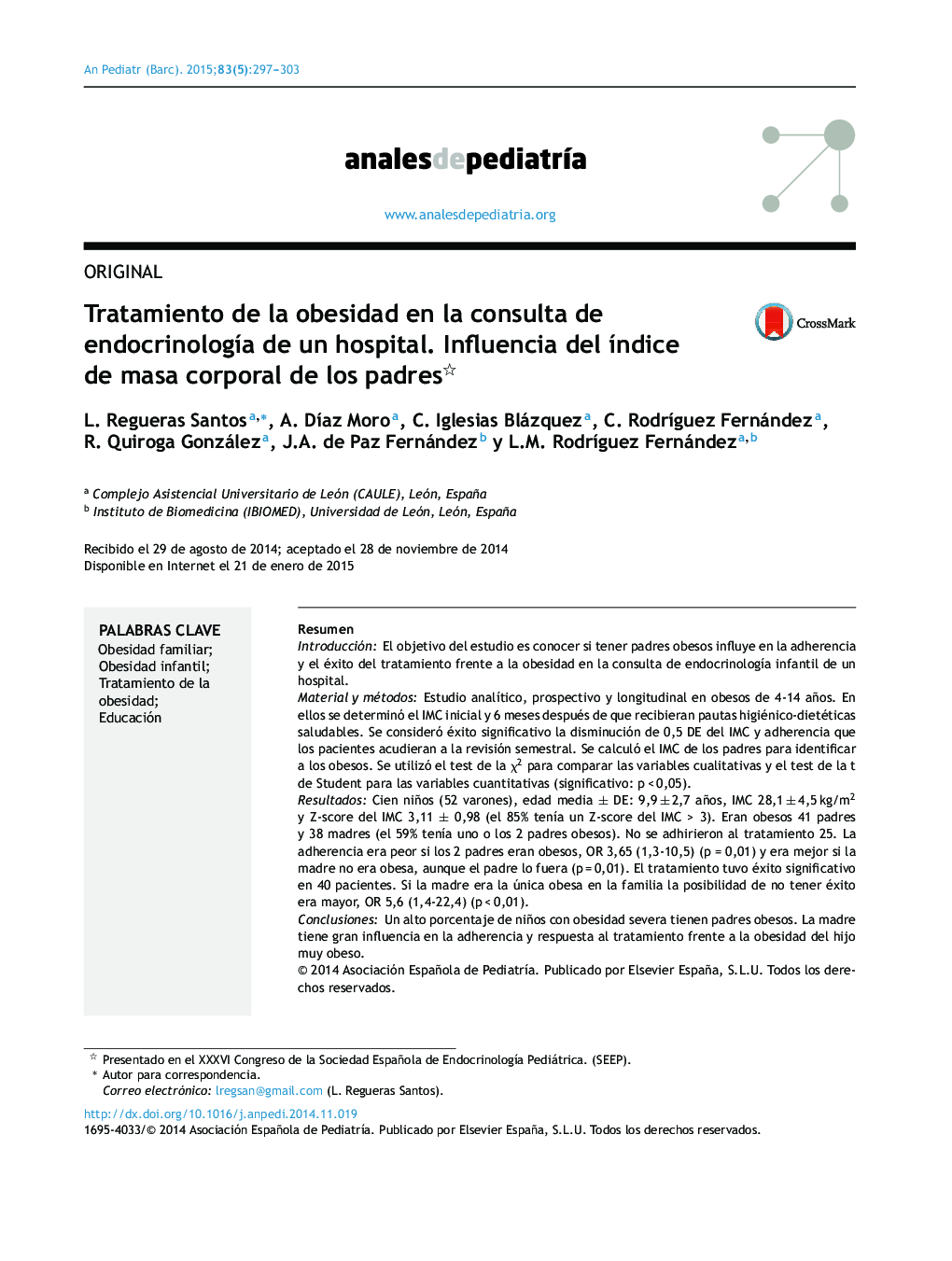| کد مقاله | کد نشریه | سال انتشار | مقاله انگلیسی | نسخه تمام متن |
|---|---|---|---|---|
| 4140946 | 1272309 | 2015 | 7 صفحه PDF | دانلود رایگان |
ResumenIntroducciónEl objetivo del estudio es conocer si tener padres obesos influye en la adherencia y el éxito del tratamiento frente a la obesidad en la consulta de endocrinología infantil de un hospital.Material y métodosEstudio analítico, prospectivo y longitudinal en obesos de 4-14 años. En ellos se determinó el IMC inicial y 6 meses después de que recibieran pautas higiénico-dietéticas saludables. Se consideró éxito significativo la disminución de 0,5 DE del IMC y adherencia que los pacientes acudieran a la revisión semestral. Se calculó el IMC de los padres para identificar a los obesos. Se utilizó el test de la χ2 para comparar las variables cualitativas y el test de la t de Student para las variables cuantitativas (significativo: p < 0,05).ResultadosCien niños (52 varones), edad media ± DE: 9,9 ± 2,7 años, IMC 28,1 ± 4,5 kg/m2 y Z-score del IMC 3,11 ± 0,98 (el 85% tenía un Z-score del IMC > 3). Eran obesos 41 padres y 38 madres (el 59% tenía uno o los 2 padres obesos). No se adhirieron al tratamiento 25. La adherencia era peor si los 2 padres eran obesos, OR 3,65 (1,3-10,5) (p = 0,01) y era mejor si la madre no era obesa, aunque el padre lo fuera (p = 0,01). El tratamiento tuvo éxito significativo en 40 pacientes. Si la madre era la única obesa en la familia la posibilidad de no tener éxito era mayor, OR 5,6 (1,4-22,4) (p < 0,01).ConclusionesUn alto porcentaje de niños con obesidad severa tienen padres obesos. La madre tiene gran influencia en la adherencia y respuesta al tratamiento frente a la obesidad del hijo muy obeso.
IntroductionParental obesity is a risk factor for childhood obesity. The aim of this study was to determine if parental obesity influences the adherence and success of obesity treatment in a hospital paediatric endocrinology clinic.Material and methodsAn analytical, prospective, longitudinal study was conducted on obese children aged 4-14. An initial body mass index (BMI), and again at 6 months after receiving health, hygiene and dietary recommendations. Success was considered as a decrease of 0.5 in the BMI Z-score, and adherence to attending the 6-month review. Parental BMI was determined to identify overweight. The χ2 test was used for qualitative variables and the T-Student test for quantitative (significance, p < <.05).ResultsThe study included 100 children (52 male), 9.9 ± 2.7 years old, BMI 28.1± 4.5 kg/m2 and BMI Z-Score 3.11 ± 0.98. (85% had a BMI Z-score > 3). More than half (59%) of the children had one or both parents obese (41 fathers and 37 mothers were obese). Treatment was not adhered to by 25 children. Adherence was worse if both parents were obese OR 3.65 (1.3 to 10.5) (P<=.01) and adherence was better if the mother was not obese, although the father was (P=.01). The treatment had significant success in 40 patients. If the mother was the only obese one in the family, the possibility of treatment failure was greater OR 5.6 (1.4 to 22.4) (P<.01)ConclusionsA high percentage of children with severe obesity have obese parents. The mother has an important influence on adherence and response to treatment for the severely obese child
Journal: Anales de Pediatría - Volume 83, Issue 5, November 2015, Pages 297–303
